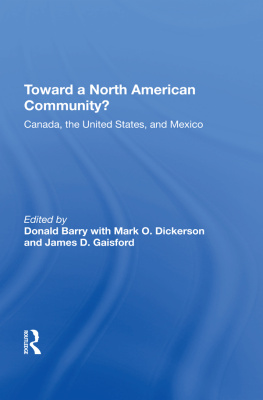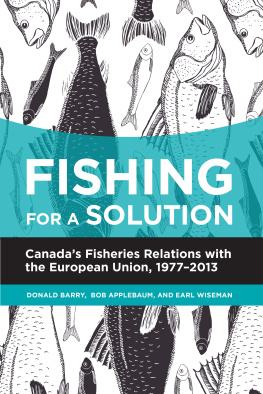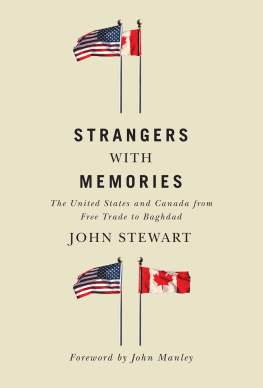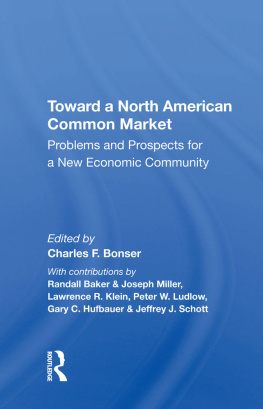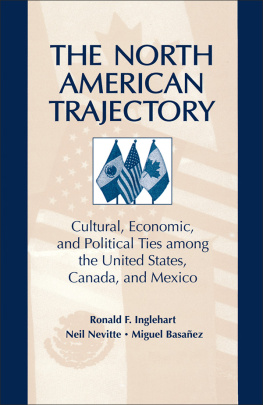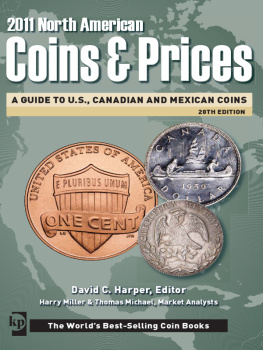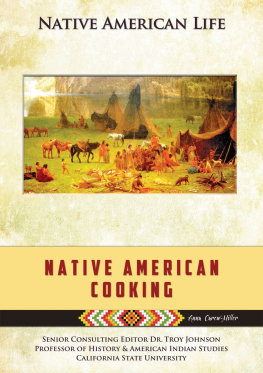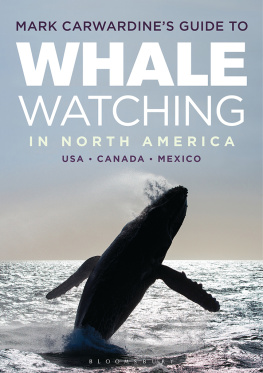Toward a North American Community?
The Political Economy of Global Interdependence
Thomas D. Willett, Series Editor
Toward a North American Community? Canada, the United States, and Mexico, edited by Donald Barry with Mark O. Dickerson and James D. Gaisford
Seeking Common Ground: Canada-U.S. Trade Dispute Settlement Policies in the Nineties, Andrew D.M. Anderson
The Challenge of European Integration: Internal and External Problems of Trade and Money, edited by Berhanu Abegaz, Patricia Dillon, David H. Feldman, and Paul F. Whiteley
The Political Economy of European Monetary Unification, edited by Barry Eichengreen and Jeffry Frieden
International Economic Sanctions, William H. Kaempfer and Anton D. Lowenberg
The European Monetary System and European Monetary Union, Michele Fratianni and Jrgen von Hagen
Profit-Making Speculation in Foreign Exchange Markets, Patchara Surajaras and Richard J. Sweeney
The Political Economy of International Organizations: A Public Choice Approach, edited by Roland Vaubel and Thomas D. Willett
Speculation and the Dollar: The Political Economy of Exchange Rates, Laurence A. Krause
Crossing Frontiers: Explorations in International Political Economy, Benjamin J. Cohen
First published 1995 by Westview Press
Published 2018 by Routledge
52 Vanderbilt Avenue, New York, NY 10017
2 Park Square, Milton Park, Abingdon, Oxon OX14 4RN
Routledge is an imprint of the Taylor & Francis Group, an informa business
Copyright 1995 by Taylor & Francis
All rights reserved. No part of this book may be reprinted or reproduced or utilised in any form or by any electronic, mechanical, or other means, now known or hereafter invented, including photocopying and recording, or in any information storage or retrieval system, without permission in writing from the publishers.
Notice:
Product or corporate names may be trademarks or registered trademarks, and are used only for identification and explanation without intent to infringe.
Library of Congress Cataloging-in-Publication Data
Barry, Donald D.
Toward a North American community? : Canada, the United States,
and Mexico / edited by Donald Barry with Mark O. Dickerson and James Gaisford.
p. cm.
Includes bibliographical references and index.
1. United StatesRelationsCanada. 2. CanadaRelationsUnited
States. 3. United StatesRelations-Mexico. 4. MexicoRelations
United States. 5. CanadaRelationsMexico. 6. Mexico
RelationsCanada. I. Dickerson, M. O., 1934 . II. Gaisford,
James. III. Title.
E183.8.C2B345 1995
327.7dc20
97-43288
CIP
ISBN 13: 978-0-367-21183-7 (hbk)
Contents
PART ONE
NORTH AMERICAN FREE TRADE IN PERSPECTIVE
Donald Barry
Gilbert R. Winham and Heather A. Grant
Michael Hart
PART TWO
MANAGING POST-WAR RELATIONS IN NORTH AMERICA
Denis Stairs
Stephen J. Randall
Gustavo del Castillo
PART THREE
PERSPECTIVES ON NORTH AMERICAN INTEGRATION
Gustavo Vega Canovas
Maxwell A. Cameron and Brian W. Tomlin
Alan K. Henrikson
Neil Nevitte
Joseph T. Jockel
PART FOUR
THE EUROPEAN UNION: LESSONS AND IMPACT
Gretchen M. MacMillan
Evan H. Potter
PART FIVE
CONCLUSION
Charles F. Doran
Guide
Most of the chapters in this volume are revised versions of papers presented at a conference on the North American Free Trade Agreement held at The University of Calgary in October 1993. The conference was sponsored by The University of Calgary and the Canada West Foundation, with the support of Alberta Federal and Intergovernmental Affairs, the Canadian Foundation for the Americas (FOCAL-West), the Canadian Department of Foreign Affairs and International Trade (International Higher Education Division), the Embassy of Mexico, the Social Sciences and Humanities Research Council of Canada, the United States Information Service and The University of Calgarys Department of Political Science, Faculty of Social Sciences, International Centre, Research Grants Committee and Special Projects Fund.
James Frideres, Roger Gibbins, Stephen Randall and William Warden made important contributions to the project. David Elton, president of the Canada West Foundation, put its resources and expertise at our disposal in arranging the conference, and the Foundation provided support for this volume. My coeditors, Mark Dickerson and James Gaisford, made a significant contribution to the conference and to the completion of the book. The contributors generously agreed to revise and update their papers for publication. Thomas Willetts insightful comments helped sharpen the volumes focus and organization. Alison Auch facilitated arrangements with Westview Press. Judi Powell provided administrative support for the conference and applied her impressive word processing skills to the manuscript. Cameron Brooks prepared the list of acronyms and the index. To all I offer my thanks.
Donald Barry
Donald Barry
The North American Free Trade Agreement (NAFTA), which came into effect on January 1, 1994, is a milestone in the affairs of the continent and in international trade. It is the first formal arrangement among Canada, the United States and Mexico and also the first trade pact involving countries of such disproportionate power and levels of development. In global economic terms NAFTA furthers a trend toward regional economic arrangements and establishes a precedent for cooperation between developed and developing countries.
Relations among the three countries have evolved along bilateral rather than trilateral lines. Canada and Mexico have depended heavily on their superpower neighbor, it being their largest trading partner, leading source of foreign investment and the principal guarantor of their security. American reliance on those countries has been less substantial but still significant. Canada and Mexico are the first and third largest trading partners respectively of the United States, and they have also been important in American strategic calculations. As well, the long U.S.-Canada and U.S.-Mexico borders have given rise to a wide range of interactions and issues. By contrast, relations between Canada and Mexico have not been extensive, although due to recent mutual interests they are expanding.
Canada and Mexico share a long-standing ambivalence toward the United States, which at times has caused them to move toward that country and at other times to follow a more nationalistic course. The U.S., reflecting its overwhelming power, has traditionally favored an expansive approach in its relations with its neighbors. Canada and Mexico, on the other hand, have been distant friends. Despite their shared preoccupation with the U.S., Mexicos orientation has been southward towards Latin America, while Canadas has been northward across the Atlantic. NAFTA thus represents a significant departure in North American relations.
This volume focuses on the management of Canadian-United States-Mexican relations in an era of emerging continental cooperation. It goes beyond the economic questions that have been at the center of much of the discussion of NAFTA to examine a range of issues, including the interrelationship between economic integration, national values and security, and explores the implications for national policies and community building in North America. Is NAFTA the first step in a wider integration process, as some observers contend? Or will its effects be more limited, as others claim? The essays consider whether the agreement will become a point of departure for broader cooperation among the three countries and identify areas in which collaboration is likely.

